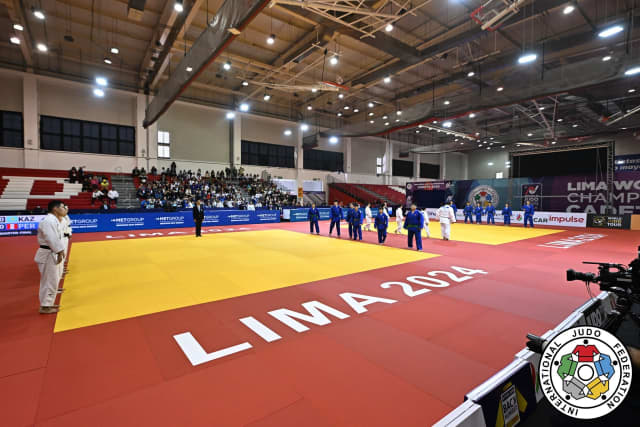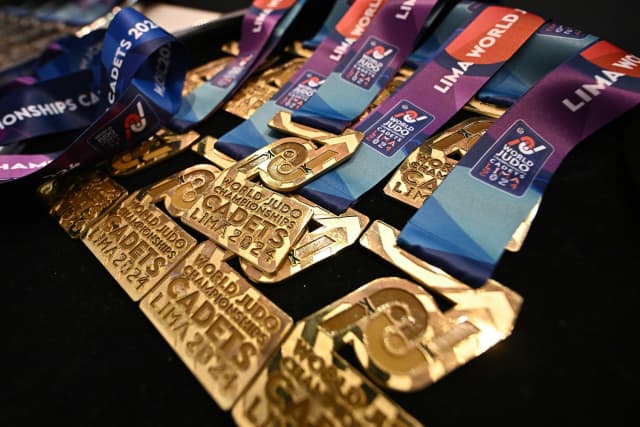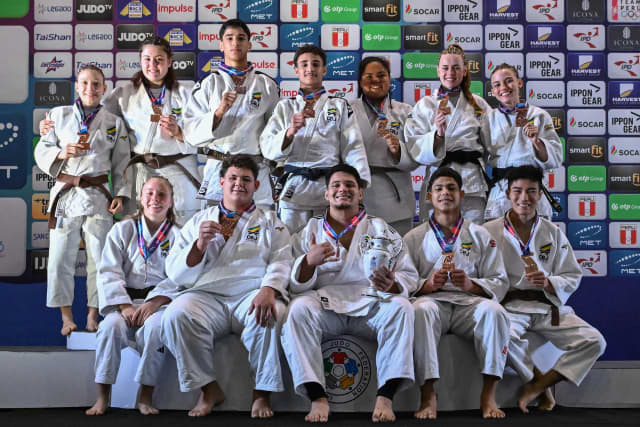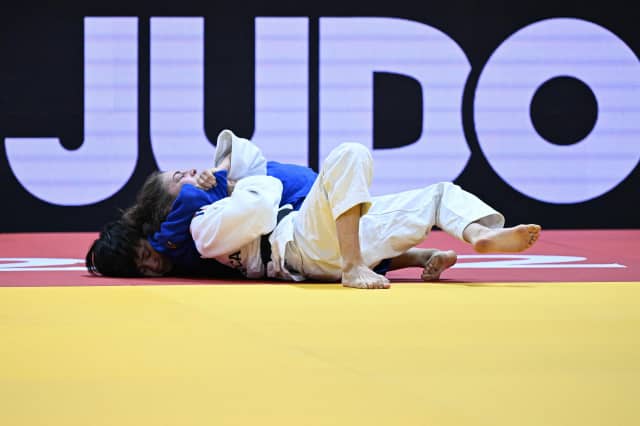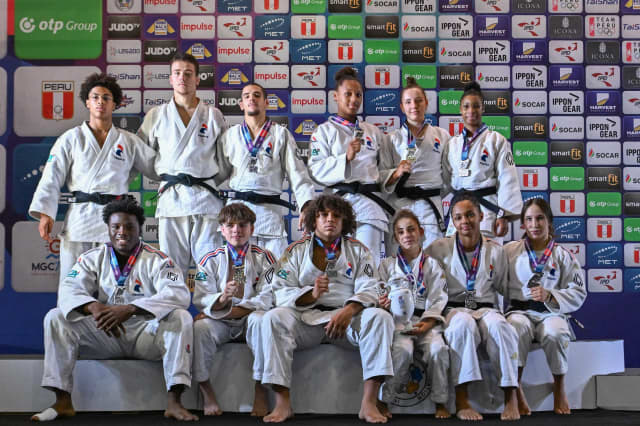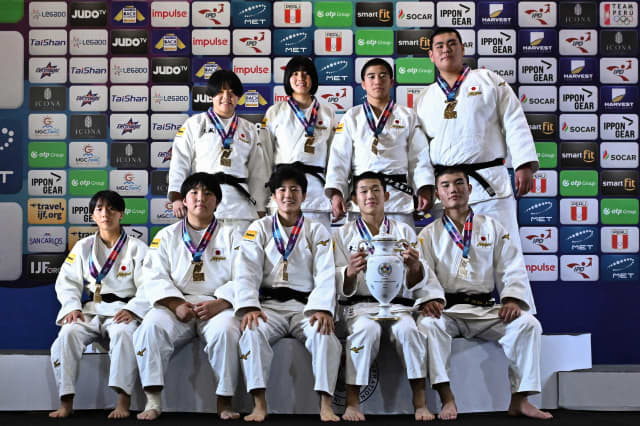In the first quarter-final, Peru went 2-0 down very quickly but Laureano (PER) at -60 kg produced an incredible throw, a ko-soto-gake entry, wrapping his whole body into his opponent to throw him for ippon. The local crowd went wild seeing Peru take a point from the experienced Kazakh team. It wasn’t enough for an overall win but it shows the progress the Peruvian national team are making.
On the other tatami, the Japan-Mongolia quarter-final was playing out in favour of Japan. Only Jamsran, Mongolia’s new world cadet silver medallist from the individual competition was able to register a win. It was 4-1 to Japan with no 6th contest fought as Japan reached the 4-win marker ahead of the final contest being needed.
In the France-Kazakhstan semi-final, the first point went to Kazakhstan at -48 kg as Shynggyskhan threw and held -40 kg world cadet silver medallist straight after ‘hajime.’ The second point went to Kazakhstan two and France looked to be struggling to find their footing at all. Agati-Alouache, new world cadet silver medallist at -57 kg, pulled a win back in the -63 kg slot, giving the team hope. Boue then took that hope and doubled it in a golden score contests against Mukhum (KAZ).
Next up for France was Minkada-Caquineau who won silver just yesterday in the individual event and she threw with a huge uki-goshi to take France into the lead.
With France ahead, Kazakhstan put out their heavyweight against yesterday’s bronze medallist Nzuzi Diasivi but he was promptly disqualified for a shime-waza action with the legs directly around the Frenchman’s neck, without an arm. This gave France their 4th point and a route to the final having started 2-0 down. Time to regroup!
In the Brazil-Japan semi-final, Brazil opened the bidding but Japan equalised straight away. For the 3rd point of the match, Japan sent newly crowned world cadet champion Honoka Kimura out against Da Costa, 57th in the world. It took longer than she might have liked but Kimura held her opponent down. Yokoo then also won by ippon to take it to 3-1 to Japan.
It looked like a loss for Brazil was imminent but Olivia Oliveira had other ideas. She threw and held Inoue for ippon, leaving the final point, either a winner for Japan or the equaliser, up to Luis Antonio Oliveira and Kiyomu Miki. Down by two penalties, Miki accelerated and threw Oliveira for waza-ari, following up on the floor for ippon. Japan won 4-0 and set-up a familiar France-Japan final.
Following the preliminary rounds, the organisers set up the arena for the medal contests and awarding ceremonies of the final block. Meanwhile another ceremony took place, to pass the IJF flag from the Peruvian Judo Federation President Mrs Maria Martinez Murciego back to the IJF, in the hands of IJF Vice President Carlos Zegarra Presser. He, in turn, passed the flag to the President of the Bulgarian Judo Federation, Mr Roumen Stoilov. Next year the world’s best cadets will meet in Sofia Bulgaria to decide the 16 new world cadet champions and the mixed team champions.
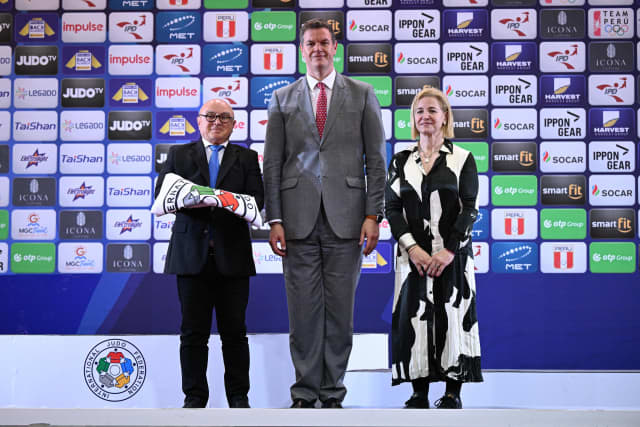
Opening the final block was the first bronze medal match, Peru against Brazil. Laureano (PER) had delivered an excellent performance at -60 kg in the preliminaries but was held down by Mitsuda (BRA) to give the first point to Brazil. In the women’s -63 kg category Brazil took the next point too, also in ne-waza, with a shime-waza which was applied sharply. The third win for Brazil also came fast as Costa earned a submission from Flores.
Peru continuing in the match or not would be down to Zoyla Nevado, who would have her work cut out against Olivia Oliveira in the +63 kg contest. However, Oliveira threw and held her to take the scoreline to 4-0. Brazil had won a bronze medal at the Lima World Championships Cadets in the mixed team discipline.
The second bronze medal would go either to Mongolia or Kazakhstan. Kabdeshov (KAZ) took the first point with an armlock in golden score having enjoyed a very close and entertaining contest with his Mongolian counterpart. It was therefore up to Ariunzaya Terbish to win the point back. The -57 kg world cadet champion was fighting up at -63 kg for the team event and the Kazakh delegate made it very difficult for her to impose her judo. Orymbek (KAZ) scored a first waza-ari which gave rise to an accelerated style from Terbish. She attacked non-stop from the two minute mark, the Kazakh struggling to obtain her grip. Eventually the strategy work and Orymbek picked up 3 penalties. The world cadet champion had shown again why she deserved such a prestigious crown.
Bayarjavkhlan (MGL) and Apak (KAZ) were up next at -81 kg. A barrage of seoi-otoshi attacks from the latter produced a first waza-ari but the Mongolian judoka didn’t blink and stepped forward ready to throw. In fact he threw twice and brought an important point back to Mongolia.
In the +63 kg category there was a clear shime-waza for Mongolia, meaning the scoreline went to 3-1 and the heavyweight men’s category would be Kazakhstan’s last chance. Unfortunately the judoka from Kazakhstan picked his opponent up from a ne-waza situation and at ‘mate’ slammed him to the mat in a way that went against the spirit of judo and he was therefore disqualified sending the final victory and the bronze medal to Mongolia.
The final was eagerly awaited, a classic match-up. France began with a point in hand due to an injury earlier in the day for the Japanese heavyweight. Yamato made sure that advantage didn’t last long, throwing Adriano for waza-ari with seoi-otoshi and holding for the necessary ten seconds to double the score. Agati-Allouache (FRA), world -57 kg cadet silver medallist and Honoka Kimura (JPN), world -63 kg cadet champion, took to the tatami for the third point. It was a very close contest, much closer than Kimura would have liked, but with a minute and a half left Kimura tried a big combination with a double uchi-mata set-up and then a with of direction catching Agati-Allouache on the skip with an okuri-ashi-harai for waza-ari. It was beautiful but not enough to finish the contest. So she got back down to work and threw again immediately with the chi-mat she had already threatened.
David Iurcovschi (FRA) was next up in an effort to slow Japan’s roll but he was thrown by Yokoo (JPN) with a circling seoi-otoshi for waza-ari. It remained the only score on the board but it was enough for Yokoo to extend Japan’s lead. Leonie Minkada-Coquineau stopped the onslaught though, throwing Inoue for ippon with o-uchi-gari.
Potentially the last contest of the day would be France’s 40 kg world cadet medallist Mathilde Aurel against japan’s Aida Inoue, who fought but did not medal in Lima in the individual competition, at -48 kg. Aika Inoue turned and held Aurel for ippon despite her giving everything to escape. This made the score 4-2 to Japan. The world cadet gold for mixed teams was heading to Japan!

